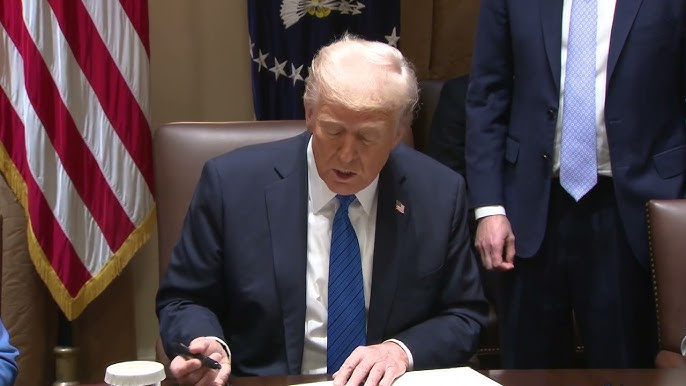President Trump Signs Sweeping Executive Order to Restore Election Integrity
In a bold move aimed at restoring trust in America’s electoral process, President Donald J. Trump has signed Executive Order 14148, titled “Preserving and Protecting the Integrity of American Elections.” The order outlines a comprehensive series of reforms designed to secure U.S. elections, enforce existing laws, and eliminate vulnerabilities exploited in past cycles.
“Election fraud—you’ve heard the term?” Trump remarked as he signed the order. “This will go a long way toward ending it.”
While acknowledging his own landslide victory in 2024, Trump emphasized that protecting the vote is a matter of principle and national survival, not personal grievance. “There are other steps that we will be taking in the coming weeks,” he added. “We think we’ll be able to get fair elections.”
Here’s a breakdown of what the Executive Order does—and why it matters.
✅ Key Highlights of Executive Order 14148
1. Documentary Proof of Citizenship to Register
States must now require proof of U.S. citizenship to register to vote in federal elections. Acceptable documents include:
- U.S. passports
- REAL ID-compliant licenses
- Military IDs
- State or federal IDs that verify citizenship
The Department of Homeland Security (DHS) must provide free access to states to verify citizenship and immigration status. States must also cooperate with DOGE (Department of Government Efficiency) in reviewing voter registration lists to ensure compliance with federal law.
2. Access to Federal Databases for Verification
The Social Security Administration (SSA) is ordered to make available:
- The Social Security Number Verification Service
- The Death Master File
- Any other federal databases that can help identify ineligible, deceased, or duplicate registrations
Earlier this year, Elon Musk and DOGE uncovered over 15 million individuals in SSA databases listed as alive at age 110+, triggering renewed scrutiny into bloated voter rolls.
3. Cracking Down on ERIC and Foreign Influence
The order directly challenges the Electronic Registration Information Center (ERIC), which currently prohibits states from checking citizenship status. This change could have massive implications for voter roll cleanup.
The order also revokes Biden’s Executive Order 14019, which federalized voter registration via agency outreach—widely criticized as using the federal government as a partisan voter registration arm.
💥 Election Technology Overhaul
4. Ban on QR Codes and Barcodes in Vote-Counting
The order bans ballot-counting systems that rely on QR codes or barcodes—such as the Dominion ICX and ES&S DS200 systems.
The Election Assistance Commission (EAC) is ordered to:
- Amend the Voluntary Voting System Guidelines 2.0 (VVSG 2.0)
- Decertify any system that doesn’t meet new standards
- Require recertification within 180 days
Note: Not one existing system currently meets the new VVSG 2.0 standards.
🔍 Targeting Lawlessness and Election Crimes
5. Enforcement of Election Law
The Attorney General is instructed to:
- Enter information-sharing agreements with the states
- Prioritize enforcement against jurisdictions that refuse to cooperate
- Review whether federal funds (including law enforcement grants) should be withheld from noncompliant states
This section directly addresses selective enforcement and political bias, such as the prosecution of whistleblowers like Tina Peters in Colorado, while ignoring security breaches committed by public officials.
🔒 Protecting U.S. Elections from Foreign Interference
6. Eliminating Foreign Control in U.S. Elections
The order prohibits non-citizens from accessing or administering any part of a federal election, including:
- Handling ballots
- Working on voting machines
- Providing election software or infrastructure
This could have wide-reaching effects on companies like Dominion, Scytl, and others that rely on foreign coding, software, or hardware components.
7. Mandatory Security Audit of Election Systems
DHS and the EAC must:
- Audit all systems connected to voter registration and vote tabulation
- Evaluate risks posed by internet connectivity, foreign components, and malware vulnerabilities
💸 Foreign Money & Political Influence
8. Enforcing Foreign Donation Laws
The Attorney General and Treasury Secretary are ordered to:
- Investigate and prosecute foreign nationals or organizations funding U.S. elections
- Crack down on lobbying groups receiving federal funds while engaging in political advocacy
This is likely aimed at foreign-linked groups such as the Sixteen Thirty Fund, financed by Swiss billionaire Hansjörg Wyss, and organizations like ActBlue, which has faced scrutiny over potentially foreign-sourced “smurf” donations.
🇺🇸 A Clear Contrast in Leadership
This Executive Order comes at a time when Democrats are narrowly winning state legislative races in traditionally conservative strongholds—despite massive GOP turnout and recent Trump victories in those same districts.
Meanwhile, Trump’s approval sits around 47%, while Joe Biden’s fell to 39% during his final year. Trump’s administration is betting that securing elections and rebuilding trust in the process will translate into sustained political dominance—and a cleaner, more transparent electoral system for generations.
📌 Final Thoughts
While this Executive Order does not go as far as Rep. Pete Sessions’ MESA Act, it marks the most aggressive executive-level push for election reform in modern U.S. history. From cleaning up voter rolls and enforcing citizenship verification to banning vulnerable election tech and choking off foreign interference, Trump has made clear that restoring election integrity is now a national priority.
“To sign this one is a great honor,” the president said, as he capped the signing ceremony.
Of course, this sweeping action is expected to face immediate legal challenges from left-leaning NGOs and partisan attorneys general. But as the administration has signaled, this is only the beginning.
The battle over the ballot box is far from over—and the American people are watching.

